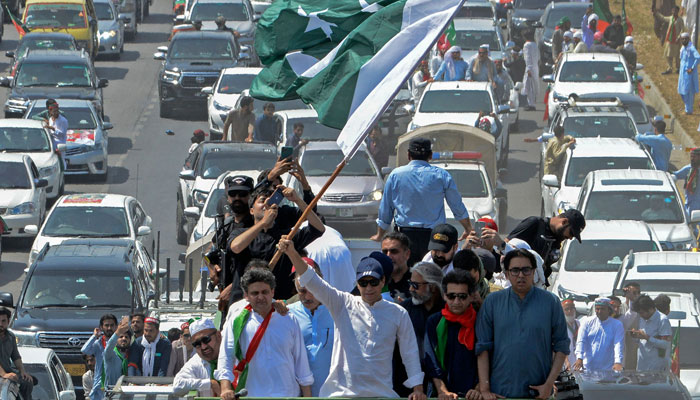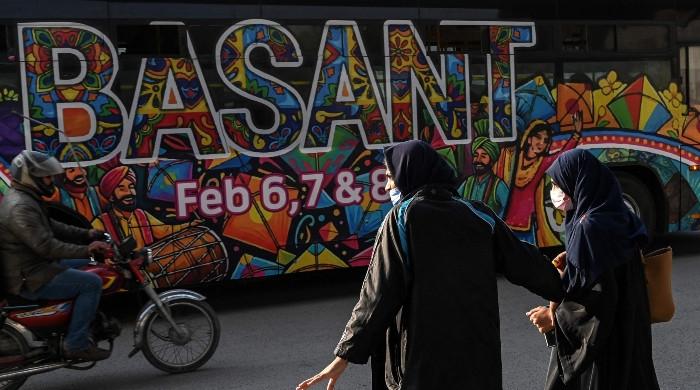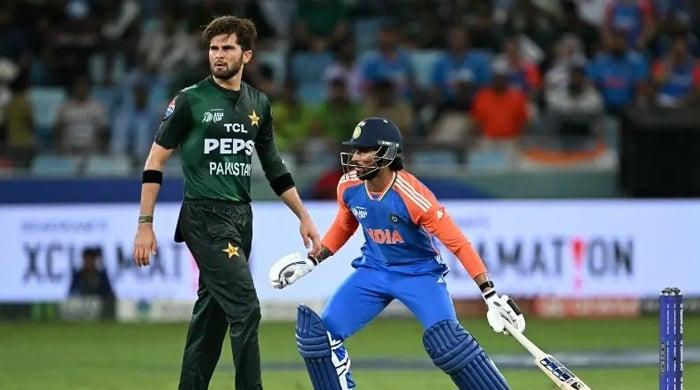Politics of aggression
PTI seems to be on a collision path not only with Shehbaz-led govt but also with the powers that be
March 14, 2024

Recent protests by the PTI in different parts of the country clearly indicate that former prime minister Imran Khan is determined to follow the confrontational style of politics, plunging the country into a perennial agitation.
He has reportedly instructed his followers to make it extremely difficult for the incumbent government to run state affairs. The PTI seems to be on a collision path not only with the Shehbaz-led government but also with the powers that be.
Khan’s stubbornness has perhaps prompted state institutions to harden their position. The recent corps commanders’ conference, vowing to punish the May 9 attacks’ perpetrators, also reflects this unrelenting stance. The statement also creates an impression that no political uncertainty or agitation will be tolerated.
The nomination of Ali Amin Gandapur as the chief minister of Khyber Pakhtunkhwa and the award of key positions in the party and parliament to hardliners have not gone down well with any stakeholder. The PTI might have thought that by making these appointments, it could pressure the powers that be into negotiating with Khan, but this approach seems to have boomeranged.
The arrests of PTI leaders and workers on Sunday (March 10) clearly show that the state will not tolerate any agitation that might affect political stability and push the country towards anarchy. The state institutions seem to have a firm belief that an investment-friendly environment cannot be created without political stability.
It is true that Khan demonstrated excellent street power in the past by paralysing Islamabad and other urban areas, but what he tends to ignore is the patronage of invisible powers that he enjoyed in the good old days. It was this patronage which helped him mount relentless attacks on Nawaz Sharif’s government in 2014.
It was again this blessing that encouraged Khan to undertake different marches. But all such favours ended with the catastrophic incident of May 9 when Khan, according to his detractors, tried to bite the hands that fed him for years.
Khan and his followers should realise that they no longer enjoy the support of the state’s mighty elements and that in Pakistan no agitation has ever succeeded without their support. If the Pakistan National Alliance managed to paralyse Zulfikar Ali Bhutto’s government in 1977, it was all because of this blessing. The anti-Ayub Khan movement was spontaneous but at a certain stage, it also attracted such blessings. The same could be said about the protests staged against General Musharraf, who had become a liability.
Political agitation between 1988 and 1999 had also blessings of the powers that be — whether it was the long march of Benazir Bhutto against Nawaz Sharif or the Tehreek-e-Nijaat of Nawaz Sharif.
So, it is in the interest of Imran Khan and his party to avoid confrontation. The party is ruling over Khyber Pakhtunkhwa and after the 18th Amendment, it enjoys enough resources to deliver and translate the rhetoric of Khan into reality. The provincial chief executive should go beyond hurling allegations against the political class and focus on addressing a myriad of crises that the federating unit is facing.
Despite all claims, the party could not offer an impressive model of governance there. Imran Khan ridiculed other leaders for choosing to seek treatment abroad, but is there any government hospital in KP where PTI leaders would like to be treated? Is there any excellent state-run school in KP where Ali Amin Gandapur and his ministers would like to send their children? Has the PTI wiped out poverty from that region? Is corruption a talk of the past? Can accountability be described as impressive? Does the province have any trace of nepotism and cronyism?
It seems Khan is trying to repeat the mistakes he committed after being ousted in April 2022. At that time, he had governments in Punjab, Azad Jammu and Kashmir, Gilgit-Baltistan and KP. He could have decided to continue ruling over those provinces, bringing drastic changes to people’s lives. But the ‘agitator-in-chief’ decided to follow a collision path, dissolving the governments of Punjab and Khyber Pakhtunkhwa against the advice of saner elements within the PTI.
Soon he lost governments in AJK and GB. He used the GB police to confront Punjab and federal forces, which did not go down well with the policymakers of the country who considered it a form of mutiny.
Since 2011, Khan has been following a policy of confrontation. First, his confrontation was directed against the political class, declaring all politicians corrupt and incompetent. This approach did a great disservice to the political system of the country. Later, he turned his guns towards his old allies who had propped him up for years. This stunned his benefactors who felt betrayed and described this attitude as nothing but ungratefulness. They tried to reconcile with him, but he was not ready to give up his recalcitrance. His tirade against the benefactors finally pushed him towards a political suicide.
It seems Imran Khan is still interested in following this suicidal approach. He is still denigrating the political class. In the past, such denigration had the backing of his benefactors, but now that is over. His love for a sectarian party and then alliance with another religious group did not go down well even within his party.
It seems the history of Khan’s politics is nothing except political immaturity. Unfortunately, he does not seem to be realising this. He is unable to reflect upon his political somersaults. He mimicked Mahmood Khan Achakzai publicly, ridiculed Maulana Fazlur Rahman, and described Parvaiz Elahi as the biggest thief of Punjab but switched his positions when the same personalities and political parties could help him succeed in his political ambitions. He once called members of the MQM-P decent people and thanked Nawaz Sharif for extending help for his cancer hospital, but turned against them for his political career. Such a hypocritical approach has badly dented his reputation among many critics.
The sages of the political world believe that politics tend to be unpredictable. Today’s enemies could turn out to be friends tomorrow and vice versa, which is why it is prudent to be politically prescient and avoid issuing statements that become a source of embarrassment.
The country is going through many crises. Issues like low economic growth, rising poverty, skyrocketing inflation, falling living standards and rising terrorism need the urgent attention of all politicians including Khan.
Threatening to influence the IMF through political agitation or letter-writing would not be appreciated by the biggest stakeholders. Perennial agitation will only spoil the political environment. The collision path will be destructive for not only Khan but the country as well.
Therefore, common sense should prevail. Khan should give up this political agitation. Nawaz and Zardari should engage with him while all institutions should confine themselves to matters they are constitutionally bound to look after. This might create the much-needed environment for political reconciliation that could go some way in ending this perennial agitation that has been plaguing the country for decades.
The writer is a freelance journalist who can be reached at: [email protected]
Disclaimer: The viewpoints expressed in this piece are the writer's own and don't necessarily reflect Geo.tv's editorial policy.
Originally published in The News











